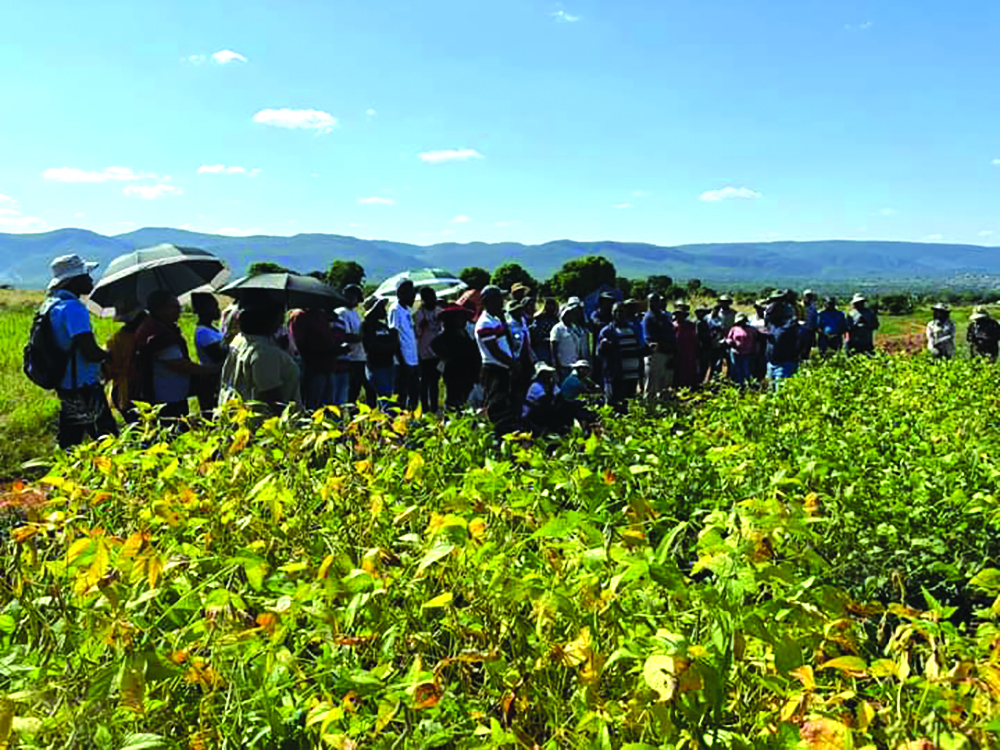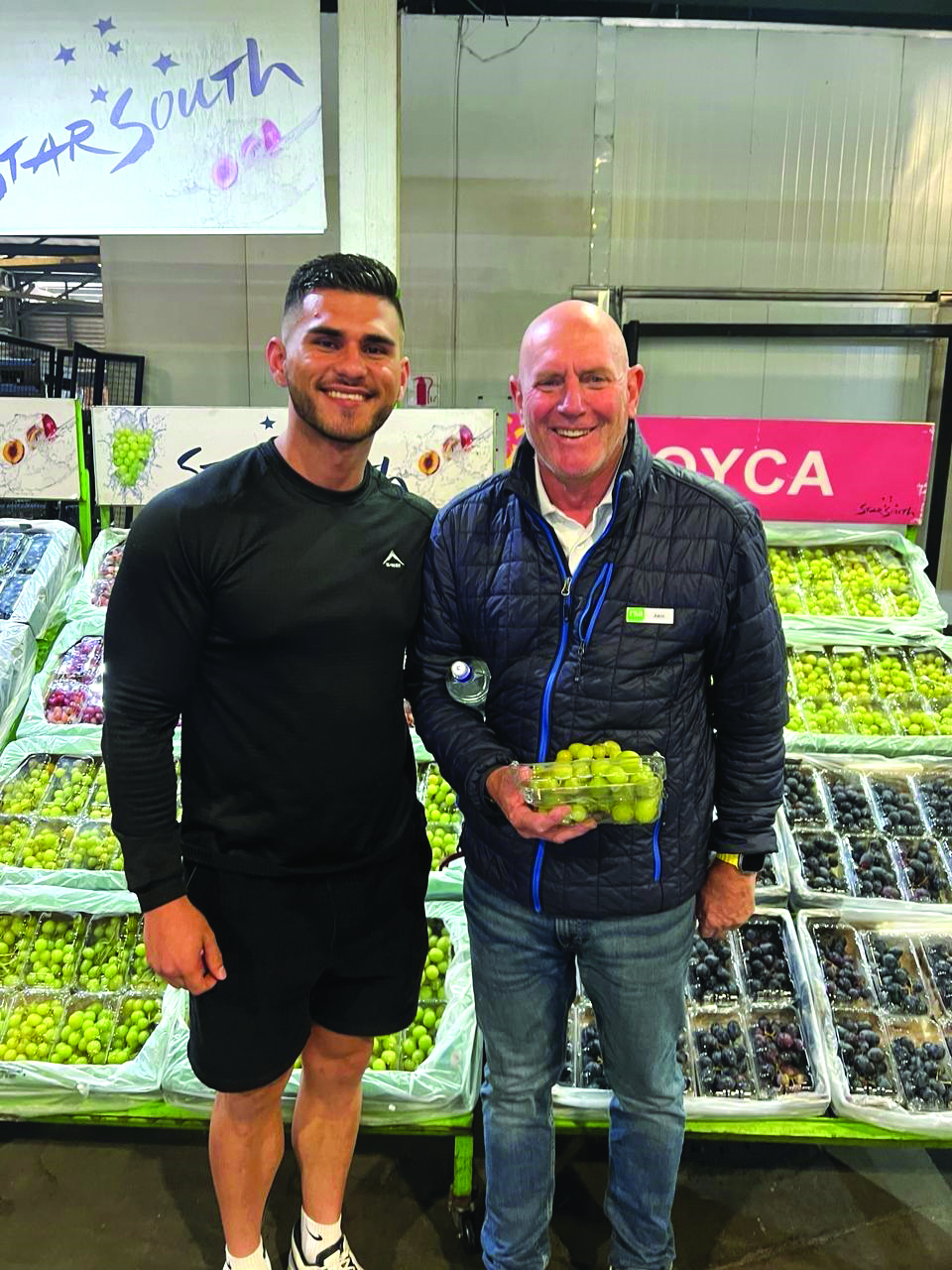Libuseng Molato
Seahlolo Newspaper, the only agricultural publication in Lesotho, collaborated with Food for Mzansi to facilitate a groundbreaking three-day study tour for Lesotho’s vegetable farmers in Gauteng, South Africa. The tour, supported by the Rural Self-Help Development Association, (RSDA) included 15 farmers representing each district of Lesotho and offered an invaluable opportunity to gain insights into advanced vegetable farming practices and market dynamics. The goal of the tour was to enhance local production and bolster self-sufficiency in Lesotho.
Lerato Matheka, co-owner and managing editor of Seahlolo Newspaper, explained the purpose of the tour, “Our goal with Seahlolo Newspaper is not only to write about and profile farmers’ successes, but to be influential and actively support them. By collaborating with Food for Mzansi, we organised this study tour to provide firsthand experience of large-scale vegetable farming and market operations so that Lesotho farmers can assess their potential, be inspired, and gain a different perspective.”
Upon arrival, the farmers visited Eat Your Greens farm, owned by Roedolf van der Merwe, who shared his inspiring journey from humble beginnings in 2014 to now earning over M3 million in monthly profits. Van der Merwe’s farm produces a variety of vegetables and emphasised the importance of understanding market demand and maintaining stringent quality standards to ensure a stable market.
The farmers learned about the critical role of hygienic practices and product safety, including the necessity of running tap water for handwashing, wearing clean protective clothing, and maintaining cleanliness in the farm industry or packhouse.
They also discovered the importance of labelling their produce, which not only informs consumers about the producer but also promotes the farmer’s brand.
Van der Merwe highlighted the significance of controlled farm visits to prevent disease transmission and the necessity of meticulous record-keeping on the farm and in the packhouse.
“It is essential to have multiple production areas to mitigate risks from accidents or disasters. For packaging plants, efficient irrigation practices are crucial,” he said, referring to water as “a silver bullet” in successful production.
The farmers then visited the Johannesburg Market, where they were hosted by Evert Schutte, the Managing Director of RSA Group, who delved into the intricacies of import-export procedures, sales, packaging, labelling, and branding.
Schutte, whose company works with prominent vegetable producers, cautioned against using another company’s branding, noting the act is both unethical and unprofessional.”Doing that is the same as stealing and there are repercussions. If you are serious about seeing your business succeed, it is important to own your branding, that way consumers will know and appreciate what you produce,” he said, stressing that using unauthorised packaging materials is prohibited in business practices.
Farmers were introduced to the concept of supply and demand pricing and were advised to familiarise themselves with Lesotho’s import and export rules and register with Johannesburg Market Produce Agents to ensure their produce remains fresh upon arrival at the market.
The visiting farmers were particularly fascinated by the techniques of preparing vegetable acreage through pre-seeding watering and advanced fertigation methods.
Their visit to the Food For Mzansi’s Gauteng Farmers’ Day, held in Vanderbijlpark at Kwa Hlabeli Farm, proved to be a wealth of information ranging from animal farming, market access, laws governing productions, and pest control.
The event served as a powerful platform for sharing insights and advancing agricultural practices, and Lesotho Farmers who are diverse producers got to enjoy information that ranged from animal farming to vegetable production and market access.
Edith Ramocaedi, a senior technical information officer at the Department of Agriculture, when speaking with the gathered farmers underscored the importance of complying with vegetable standards, including grading, packing, and marking requirements, so as to encourage consumer confidence in food safety and quality.
Tlou Kabe from the marketing information systems directorate, for his part, emphasised the importance of conducting market research. Vander Merwe stressed building long-term relationships with reputable suppliers and staying updated on genetic advancements make part of the winning ingredients for farmers.
Their visit to TBG farm proved to cement the reality that there is no such thing as impossible in farming as they witnessed successful produce on sandy soil.
The manager of the farm, Thabo Sekgobela, ran through the different types of irrigation systems used at the farm and stressed the importance of irrigation before seeding.
“That practice helps to add an adequate amount of moisture and also allows seeds to absorb all applied fertilisers before ploughing,” he explained.
He noted that they pump water from the river, then mix fertilisers and pesticides with agro boosters in a separate tank, then allow the needed amount to go through the water pipes as they are recommended to always use liquid fertilisers by the extension officers.
Aside from getting water from the river, Sekgobela said they also have a borehole to opt for to reduce electricity expenses in case the river runs dry.”One thing I learned from this trip is that South African farmers are determined to produce regardless of soil quality, believing nothing can hinder farming. This revelation challenged us because when we look at the different types of soil we have in Lesotho, we can safely say we have an opportunity to increase yield. All we have to do is employ these techniques we learned from here,” said Liphapang Tjaoana, a farmer from Maseru.
Molefi Sepetla, a farmer based in Mokhotlong, noted that they identified opportunities to cut imports and collaborate to meet Lesotho’s demand.
“South African farmers’ success lies in their collaborative efforts. After visiting the Johannesburg Market, we saw an opportunity to export potatoes, especially because we are confident in the superior quality of Lesotho’s soil,” he said.
The study tour was highly beneficial, as the farmers learned where they can improve in vegetable production and sales, according to Lintle Tsumane, the Management Information Officer of the Rural Self-Help Development Association (RSDA). She noted that her organisation works with smallholder farmers to transition to commercial farming, with aggregation being at the centre of their work. The tour directly aligned with their mandate.
“The farmers were particularly challenged when we arrived at the Johannesburg Market. What we saw emphasised the need to produce in larger quantities to sustain the demand of a large market. This tour was helpful because it highlighted collaboration as a crucial element for success.
Mopeli Molapo, a farmer from Leribe, expressed gratitude to Seahlolo for organising the study tour and emphasised the importance of such experiences for other farmers.
“We recommend that others invest in and participate in similar study tours to gain firsthand knowledge of effective farming practices and grow their farms. Those of us here today promise that Lesotho’s vegetable production will increase because, unlike before, we have been armed with the skills and knowledge to do it differently,” he said.

Your Trusted Source for News and Insights in Lesotho!
At Newsday Media, we are passionate about delivering accurate, timely, and engaging news and multimedia content to our diverse audience. Founded with the vision of revolutionizing the media landscape in Lesotho, we have grown into a leading hybrid media company that blends traditional journalism with innovative digital platforms.









